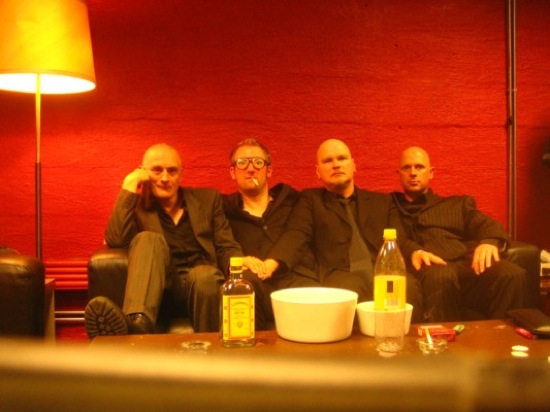German band Bohren & Der Club Of Gore, arguably one of the progenitors, and certainly one of the very finest exponents, of doom jazz on the planet, are making one of their criminally rare live appearances at Supersonic Festival this weekend. For those unfamiliar, it’s worth the potted history. With a background sweat-soaked in hardcore and heavy metal, Bohren & Der Club Of Gore began their alchemical experiments in combining jazz, ambient and doom metal in the early 1990s. Arguably, their laboratorial tinkerings produced sheer genre-defining gold around the turn of the century, releasing the mind-bendingly excellent Sunset Mission in the nascent new millenium. Deftones’ Chico Moreno told tQ in 2010 that this was one of his favourite albums, putting it at a well deserved number three in his Bakers’ Dozen.
The band (which incidentally doesn’t include any member named Bohren; it’s German for ‘drilling’ – also ‘to bore’ or ‘to sink’, and the ‘club of Gore’ is a reference to the 80s Dutch noise band Gore, of whom they were all fans) followed up Sunset Mission with Black Earth, released on Mike Patton’s Ipecac label, continuing along their odd and unsettling subterranean trajectory. Dolores, their last full album to date, released in 2008 again on Ipecac and the band seemed, with this album, to have struck a glimmering, fragile melodic seam. The word ‘etherial’ applies, with best-fit metaphor being a Turner-esque spectacular yet storm-drenched pervasive light. Mini-album Beleid again showed a slight shake-up, with their instrumental textures finally allowing sufficient breathing room for vocals, with Mike Patton guesting on the impressive and characteristically atmospheric Warlock cover ‘Catch My Heart’.
Comparisons are often made with the music of Angelo Badalamenti, particularly his early 90s work with David Lynch on Twin Peaks. Bohren & Der Club Of Gore fully embrace Badalamenti as an influence, admitting to a love of Fire Walk With Me and declaring a similar interest in a horror aesthetic. But how does this translate to a festive live performance, even a festival as weird-appropriate as Supersonic? Will they transform Birmingham’s The Custard Factory into a suitable environment for their intense, treacly, claustrophobic and frankly brilliant slow-slung sound?
Before their 7.45pm slot on the Boxxed stage, we talked to multi-instrumentalist Christoph Clöser.
Do you enjoy playing in a festival environment and do you think festival environments are condusive to listening to your music?
Christoph Clöser: We like playing on festivals because of the atmosphere and because we have the chance to listen to the music of other bands. Of course, we prefer to have a comfortable soundcheck and that’s not always given in a festival environment, but if necessary we play with a line-check, too. It doesn’t really matter where we play. We always offer our music in the same way and with the same enthusiasm – and if the audience is strong enough to suffer uneventful music we and the listeners can celebrate as a kind of a mass.
Your last album, a short three tracks, was recorded in 2011. What are you working on at the moment?
CC: We are working on a new CD, which will (hopefully) be released in late 2013. It’s strictly instrumental. The three songs on Beleid didn’t fit our last album and won’t fit our next one, but we had an uncanny desire to record these songs. So we made a mini-album to bridge the time until the next "real" Bohren album.
What can we expect from your set at Supersonic Festival? What is your usual approach to playing live, and are you mindful of the audience when performing?
CC: That’s a difficult question. We love our music we made, and still make, if first of all for ourselves. We are still interested in playing slow music in all its facets, we still like it to get lost in details and we are very happy and emotionally touched (and surprised, too) that there exist a great number of listeners, who follow us and are interested in our stuff. We like playing live, as we like working on new songs – two sides of one thing. We don’t have any expectations to our listeners. Everybody is welcome, everybody is able to find something special for himself in our music and if they don’t, it’s okay, too.
You have said in the past that the rarity of your live performances is related mainly to your other commitments – full time jobs, etc. Do your professions have any influence on your creativity or affect your creative process?
CC: There has been always our daily lives with its experiences and inspirations and jobs, who steal time, around us – and that will continue in future, but despite all that we create our music. We are how we are and our music is how we want it. We don’t think too much about us. We try to keep things simple and try to stay snoopy and lowly. Our creative process has not really changed over the years; we have learnt some things and, probably, we work more economically now.
You then collaborated with Mike Patton on the Warlock cover track on Beleid. Would you consider further collaborations?
CC: If there is time, a good idea, something which interests us, we are open for everything. All collaborations in the past and in the future have been or will be decided in the light of this.
You never use backdrops or films to accompany your music. Why do you reject the idea of having a visual element to your shows?
CC: We want to give the listener the opportunity to hold communion with himself.


